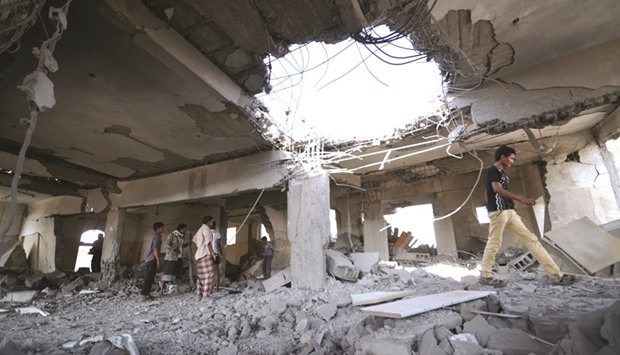Saudi-led coalition air strikes on rebel-held security buildings in western Yemen have killed at least 60 people, many of them inmates buried under the rubble of a detention centre.
The strikes late Saturday came just hours after other coalition raids hit three buildings in the southwest.
The coalition said yesterday in its first comment on the attack that the security building in Hodeidah was used by Houthi forces as a command centre.
“Coalition aircraft this morning targeted the central security building in Hodeidah.
This building is used by Houthi militia and the forces of the deposed president as a command and control centre for their military operations,” a coalition statement said, referring to former head of state Ali Abdullah Saleh, a Houthi ally.
“The coalition forces’ leadership stresses that targeting protocols and procedures were followed fully.”
The Shia Houthi rebels yesterday said a new UN peace plan aimed at ending the country’s 19-month-old war was a “basis for discussion” despite “fundamental flaws”.
Yemen’s President Abd-Rabbu Mansour Hadi on Saturday, however, rejected the proposal aimed at ending fighting between forces loyal to his government and the rebels and their allies.
The war escalated in March 2015 when the coalition launched a military campaign to push back the rebels, after they seized the capital in 2014 and then advanced on other parts of Yemen including the province of Hodeidah.
In the latest deadly strikes in Hodeidah, which the rebels have controlled since late 2014, coalition warplanes hit a rebel-held security compound in the town of Zaidia.
“Sixty people in total were killed and dozens were wounded,” a health official said.
Most of the victims were anti-rebel detainees who were being held among 100 inmates in two cells at the detention centre, he said.
It remains unclear why the coalition would hit a detention centre holding anti-rebel inmates.
International aid groups have repeatedly voiced concern over the rising need for aid in Yemen, where malnutrition has increased in the past few months.
The conflict has killed nearly 7,000 people, mostly civilians, since March 2015, according to the United Nations, which has been struggling to convince the warring parties to implement a ceasefire and revive a stalled political process.
The rebels said the plan by UN envoy Ismail Ould Cheikh Ahmed did not include a “total, permanent ceasefire” or foresee lifting the blockade against areas they control.
The contents of the roadmap, which Hadi rejected on Saturday, have not been made public.
But informed sources say it calls for agreement on naming a new vice president after the rebels withdraw from Sanaa and other cities and hand over heavy weapons to a third party.
Hadi would then transfer power to the vice president who would appoint a new prime minister to form a government in which the north and south of Yemen would have equal representation.
The president has slammed the UN proposal as one that “rewards the putschists while punishing the Yemeni people and legitimacy”.

People gather at a detention centre struck by Arab coalition warplanes in Zaidia district of the Red Sea port city of Hodeidah, Yemen yesterday.
